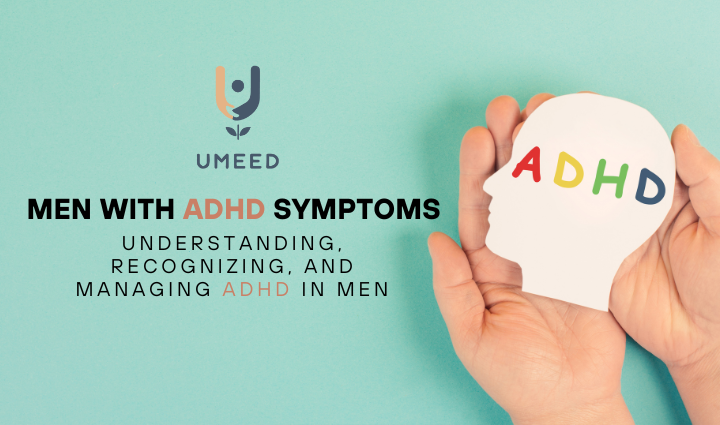
Men with ADHD Symptoms – Signs, Impact & Effective Solutions
- February 22, 2025
- 0 Likes
- 7368 Views
- 0 Comments
Attention-Deficit/Hyperactivity Disorder (ADHD) affects millions of people worldwide, yet it often goes undiagnosed in adults, especially men. Many men with ADHD symptoms struggle with focus, organization, and impulsivity without realizing that their difficulties stem from a neurological condition rather than personal shortcomings.
This article will explore the symptoms of ADHD in men, how they impact daily life, and ways to manage them effectively.
Understanding ADHD in Men
ADHD is a neurodevelopmental disorder characterized by inattention, hyperactivity, and impulsivity. While it is commonly diagnosed in childhood, many men do not receive a diagnosis until adulthood. This delay can lead to years of frustration, misunderstandings, and struggles in both personal and professional life.
Men with ADHD symptoms may be perceived as forgetful, irresponsible, or even lazy, but in reality, their brains process information differently. Recognizing these symptoms is the first step toward better management and improved quality of life.
Common Symptoms of ADHD in Men
1. Inattention and Forgetfulness
One of the most noticeable symptoms of ADHD in men is difficulty maintaining attention. This can manifest as:
- Trouble focusing on work or conversations
- Easily getting distracted by external stimuli
- Frequently forgetting appointments, deadlines, or important dates
- Losing everyday items like keys, wallets, or phones
2. Hyperactivity and Restlessness
While hyperactivity is more common in children, it can persist into adulthood. Men with ADHD symptoms may experience:
- A constant need to move or fidget
- Difficulty sitting still for extended periods
- A feeling of inner restlessness or being “on edge”
- Engaging in high-energy activities even when inappropriate
3. Impulsivity and Poor Decision-Making
Impulsivity can create challenges in both personal and professional life. Some common signs include:
- Speaking or acting without thinking
- Interrupting others in conversations
- Struggling with patience and waiting in lines
- Making impulsive purchases or risky decisions
4. Emotional Sensitivity and Mood Swings
Men with ADHD symptoms often struggle with emotional regulation, which can lead to:
- Frequent mood swings
- Difficulty managing frustration and anger
- Feeling overwhelmed easily
- Low self-esteem due to perceived failures
5. Time Management and Organization Issues
A significant challenge for men with ADHD is managing time effectively. They may:
- Underestimate how long tasks will take
- Procrastinate or struggle to start projects
- Have a cluttered workspace or home
- Miss deadlines and struggle with prioritizing responsibilities
How ADHD Affects Daily Life in Men
Workplace Challenges
Men with ADHD symptoms often find it difficult to stay organized at work. They may miss deadlines, have trouble completing projects, or frequently switch between tasks. This can lead to frustration from employers and colleagues, making career advancement more difficult.
Relationships and Social Life
ADHD can also impact relationships. Forgetfulness, impulsivity, and inattentiveness can lead to misunderstandings with partners, family, and friends. Many men with ADHD symptoms struggle to maintain long-term relationships due to these challenges.
Financial Struggles
Impulsivity often affects financial decisions. Men with ADHD may make unplanned purchases, struggle to pay bills on time, or have difficulty managing a budget, leading to financial instability.
Effective Strategies for Managing ADHD
1. Create a Structured Routine
Having a daily routine can help men with ADHD symptoms stay organized and focused. Using planners, to-do lists, or phone reminders can make a significant difference in managing responsibilities.
2. Break Tasks into Smaller Steps
Large tasks can feel overwhelming, leading to procrastination. Breaking them down into smaller, manageable steps can improve productivity and reduce stress.
3. Practice Mindfulness and Relaxation Techniques
Meditation, deep breathing, or yoga can help men with ADHD symptoms manage restlessness and improve focus. These techniques also aid in emotional regulation.
4. Exercise Regularly
Physical activity can reduce hyperactivity and increase focus. Regular exercise, such as walking, running, or weight training, can help manage ADHD symptoms effectively.
5. Seek Professional Help
Therapy, coaching, and medication are available options for managing ADHD. Consulting a healthcare professional can provide personalized strategies and support.
Final Thoughts
Men with ADHD symptoms often face unique challenges that impact their work, relationships, and overall well-being. Recognizing these symptoms is crucial for developing effective coping strategies and improving quality of life. By creating structure, practicing mindfulness, and seeking professional support, men with ADHD can better manage their symptoms and thrive in daily life.
Recognizing and managing ADHD symptoms in men is crucial for improving their quality of life. If you or someone you know is experiencing these challenges, seeking professional help is vital.
UMEED, a leading mental health platform in Pakistan, offers comprehensive services tailored to individuals dealing with ADHD. Their team of experienced psychiatrists and psychologists provides personalized care, including:
- ADHD Diagnosis: Utilizing standardized assessments to ensure accurate identification of ADHD symptoms.
- Medication Management: Prescribing and monitoring medications to help control ADHD symptoms effectively.
- Psychotherapy: Offering behavioral therapy and cognitive-behavioral therapy (CBT) to develop coping strategies.
- Coaching and Support Groups: Assisting with time management, organizational skills, and providing a supportive community.
To learn more about their services, visit ADHD Services at UMEED and ADHD Treatment in Pakistan.
Contact UMEED:
- Phone: 0343 6004992
- Email: [email protected]
Taking the initiative to seek professional support can make a significant difference in managing ADHD symptoms and leading a fulfilling life.
